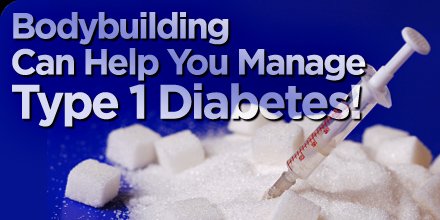Article Summary:
|
Picture the scene: you are twelve years old, sitting in your doctor's office and he announces that you have type 1 diabetes and that you will have to take insulin shots for the rest of your life.
This is what happened to top professional bodybuilder, Colette Nelson, as she revealed to me recently in a very candid and personal interview, where she not only spoke about her own journey through life with this demanding condition, but, in so doing offered real hope and inspiration to fellow athletes with diabetes.

[ Leigh Penman ] So Colette, let's start with that initial diagnosis.
[ Colette Nelson ]
- When I was diagnosed with diabetes at 12 years old, it was definitely a shock. As it happens, my father had been diagnosed with type 1 diabetes about two years prior, which is unusual because most people are diagnosed as a juvenile, before 18 years old. However, the simple fact is that type 1 diabetes can happen at any age and this is something I really want to educate people about.
Type 1 diabetes can happen at any age. It could happen to you. It is an auto-immune disease, and we don't know why all of a sudden the immune system decides to pull the trigger.
| RELATED ARTICLE | |||
|
Author: Marie Spano |

[ LP ] I think this is important to point out because many people, myself included, do not associate diabetes with the immune system.
[ CN ]
- Most people who develop type 1 diabetes have immune markers in their blood, such as antibodies against
- , islets, or the enzymes Glutamic Acid Decarboxylase (GAD) and IA2 (also known as ICA 512). By measuring these markers scientists can now gauge the risk of developing type 1 diabetes.
In my case, I got sick with strep throat and a virus and that's what triggered it. Basically, you have to have the antibodies, and then an external trigger.

[ LP ] So what was your initial response when you were told you had type 1 diabetes?
[ CN ]
- I asked the doctor if I could take pills? He told me that I didn't have that type of diabetes, I had a different kind and I would have to take insulin shots for the rest of my life. I mean, when somebody says that to you, you are like, 'Oh my god, tell me anything but something for the rest of my life!'
- Then I asked him what I had to do to stay healthy. He told me to
- , watch my
- and take my blood sugar. From that point I never looked back. At thirteen years old I joined a gym and I kind of gradually got into working out that way.

[ LP ] Taking a leap forward in time, how did you handle your first competitions? I mean, this is a time when even a 'normal' person can suffer blood sugar disturbances due to the stress of strict dieting... not to mention the sheer stress of contest day itself...
[ CN ]
- Well, I really only started talking about diabetes around three years ago. At the beginning of my career no one even knew. When I first started competing I kept it to myself and would keep a check on my blood sugar secretively by doing it inside my bag or in the bathroom so that no one would see me.
I mean I had so much more to worry about than most of the other women. I had to make sure my blood sugar didn't go too low on stage. I mean forget the whole carbing up thing, that's way too complicated for me. I can't even think about carbing up. If you don't do it right and you end up drying out too much, forget about it. Insulin doesn't work in a dry environment; it likes a fluid environment.
| RELATED ARTICLE | |||
|
Author: Dr. David Ryan |
- In addition to this, in my first few shows my blood sugar would end up spiking. Now I manage to keep it below 200 and, ideally, never going above 140. It is a struggle, it really is. I mean my energy is good; it's just that I have to be so careful.
I have to keep checking every fifteen to twenty minutes because I have to take minute amounts of insulin just to make sure my blood sugar stays straight. The last thing I want to do is let it get really high because the next thing that happens is it falls really low, and I don't want that to happen when I am one stage. I mean, how embarrassing...

[ LP ] I am sure I am not alone when I say that's one thing you will never be Colette, embarrassed on stage! As far as working out goes, do you have to put any restrictions on the amount of time you spend in the gym?
[ CN ]
- That's an interesting question, because I love to
- ! As a diabetic, you don't need to limit your time in the gym as long as you are really aware of your blood sugar. I test my blood sugar before I train, after I train... and sometimes during a workout. It's a constant battle every day of my life.
- Usually I test my blood sugar about 15 times a day and it's annoying, and it does suck, but it's the only way I can make sure that I keep my blood sugar between 70 and 120.
Usually your blood sugar will rise when you are working out. It's weird, but I have actually gone into workouts where my blood sugar was 70 (an medical researchers would tell you never to workout with a blood sugar of 70!) and when I finish the workout I am 100. Now you are talking about a two-hour workout. It really comes down to knowing how much food you have eaten and the timing of the insulin.
On the other hand, there have been times, especially when I am getting ready for a show, that my blood sugar has dropped. In this case I have to have something to eat and then just sit there for 30 - 40 minutes until my blood sugar stabilizes and then go back to my workout. Thankfully, that doesn't happen to me that often, just maybe when I am near the end of a contest diet and I'm depleted.

[ LP ] This kind of puts a whole knew perspective on dealing with people in everyday life who complain of low blood sugar.
[ CN ]
- Right, they don't have a clue! Normal blood sugar is around 70-100. To give you an example, this morning I was about 68 and I didn't want to treat it. I was hungry, but on the other hand I had just eaten.
I couldn't really have another meal for a couple of hours... I mean I'm a bodybuilder. I don't want to get heavy and gain weight, so I just have to sit there with that hunger. So you know, as a bodybuilder, it is definitely more challenging because if you want to keep your blood sugar tight, you want to be on the lower side.
| BODYBUILDING.COM FORUM: DIABETES | |||
|
Started By: bballbrett5 |
- can be complete h#ll. I mean, even someone who doesn't have diabetes is going to experience low blood sugar on a contest diet. They may easily fall into the 60's, but try getting into the 50's, the 40's and sometimes more dangerous than that. I mean, if you start dropping below 20 you can go into a diabetic coma. If my brain doesn't get enough glucose then it's game over!
That's why I am constantly monitoring. I have to start preparing for a show much earlier. I have to do a transition because my insulin requirements change so dramatically. As you start to lose weight you need less insulin, the whole world is like that.
The thinner you are, the less insulin you need. I have to start dieting much earlier and there are going to be times when I have to 'cheat', because it's my life we are talking about.

[ LP ] Another thing worth mentioning is the growing use of insulin amongst athletes who do not have diabetes. How do you feel about this?
[ CN ]
- There have actually been deaths due to non-diabetic use of
- . Athletes who use insulin as a so-called 'ergogenic' aid do not know what they are doing. They are literally dancing with the devil. I mean, it's crazy, but a lot of bodybuilders, when they find out that I am a type 1 diabetic say, 'oh my god, that must help you so much as a bodybuilder.'
I mean you could take away everything that I have got if I didn't have to deal with this every single day! They are using it to get some sort of pharmaceutical response to it when it comes to building muscle and they are playing with fire.
| RELATED ARTICLE | |||
|
Author: MuscleTech |

[ LP ] I couldn't agree with you more! So, getting back to the 'real world' of insulin use. What would you say to a bodybuilder who came to you after just having been diagnosed as a diabetic and who wanted to continue in the sport?
[ CN ]
- I would sit them down and say to them, 'what you have to deal with is a battle, but you are a bodybuilder, so you are facing battles every day. However, if you are not committed to testing your blood sugar 10 to 15 times a day, then bodybuilding is not for you.'
It's really not that bad, I have all the people I work with do it. You have to be able to know where your blood sugar is at. You can't go into the gym and train unless you know this because if your blood sugar is too low, your workout is going to suck. If it is too high then you are going to be burning muscle.
- So you have to commit to testing and you have got to commit to taking as many shots a day as it takes. That's where doctors fail, they want to make it easy and tell you to take three shots a day.
As bodybuilders, we eat five to six times a day and, guess what, you need insulin every time you eat. That makes a minimum of six shots a day. I take twelve because I take a shot calculating what I am going to eat and then I test my blood sugar after a meal to make sure it doesn't rise over 140, because if it does I need more supplemental insulin.
So these are the tools I teach to people so that they can better manage their diabetes. I also make sure that they are in regular communication with their doctor.

Conclusion
So, when it comes to keeping it (blood sugar) tight, Colette Nelson - as a certified diabetes educator - certainly knows what she is talking about. She has learned, not only to deal with this illness in a very courageous and inspiring way, but also to use it as an opportunity to help others who face the same condition.
The fact that she has also reached professional status and gathered a sack full of trophies and world titles along the way, speaks volumes when it comes to displaying her true strength and courage. I hope that you, like me, will find inspiration in her story.








